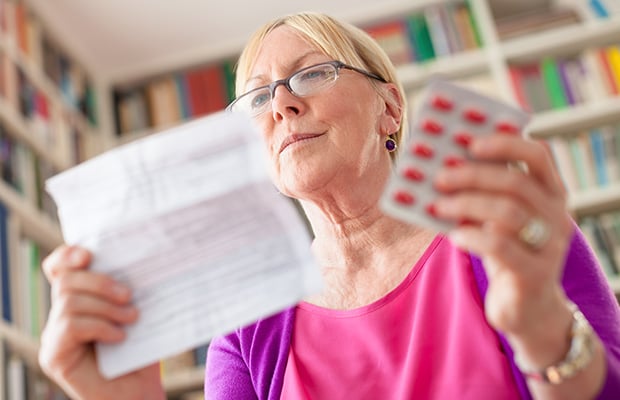What's on this page
Why there can be a ‘best time’ to take your medicine
When you take your medicine can impact how it works. Some are more effective at certain times of day, while others can have inconvenient side effects if taken at the wrong time.
Factors that affect what time you should take your medicine include:
The body’s natural rhythms
Your body clock can influence how well medications work. For example, you produce more cholesterol at night.
How long the medicine lasts
Some medicines are processed quickly by the body and may need to be taken multiple times in a day, while other, slow-release medications stay in the body for a longer time.
Taking with meals
Some medications need to be taken on an empty stomach, while others need food to help them be absorbed.
Side effects
Sometimes common side effects need to be considered. For example, if a medicine makes you drowsy, it might be better to take it at night. By contrast, if a medication makes you pee a lot, you may not want to take it just before bed.
Drug interactions
If you’ve been prescribed many medicines, you’ll need to chat with your pharmacist or GP to understand how they might affect each other (this is known as ‘drug interactions’). You may need to take them spaced out at different times of the day.
Want to get fit and healthy?
Sign up to our fortnightly Heart Matters newsletter to receive healthy recipes, new activity ideas, and expert tips for managing your health. Joining is free and takes 2 minutes.
I’d like to sign-up
Guidance on when to take specific medicines
Below are the usual recommendations for medicines taken by people with heart conditions, high blood pressure, high cholesterol or type 2 diabetes.
But remember that everyone’s health needs are different. Talk to your doctor or pharmacist about what will work best for you.
Anticoagulants
Taken to prevent blood clots, these are sometimes called ‘blood-thinners’. For some anticoagulants, the time you take it is not important. Others, such as rivaroxaban, need to be taken with food to help your body fully absorb them.
Antiplatelets
Antiplatelets prevent platelets (a type of blood cell) forming blood clots. Some, like a 75mg dose of clopidogrel, are usually given once a day and it does not matter what time you take it, as long as it’s around the same time each day.
By contrast, ticagrelor is typically given twice a day. On the first day, you may be asked to take the tablets at the same time, but afterwards you’ll space them out in the morning and evening.
Blood pressure tablets
Many types of medicines are used to treat high blood pressure and you may be prescribed more than one.
Here are the best times to take each type:
- Angiotensin receptor blockers and ACE inhibitors, such as candesartan and ramipril, work by widening your blood vessels. These can make you feel dizzy when you take your first dose, so it is usually suggested you take your first dose at bedtime. After that, you can take it at any time of day, as long as it’s the same time every day.
- Beta blockers like bisoprolol, slow down your heart rate making it easier for your heart to pump blood around your body, which lowers your blood pressure. They can also make you feel dizzy at first. So, it’s best to take your first dose at bedtime until you no longer feel dizzy, before switching to the morning.
- Calcium channel blockers help your blood vessel walls relax. Some, like amlodipine, are taken once a day at a regular time of your choice. Verapamil can be taken once or twice daily, depending on what it is being taken for. If you are taking it during day, it should be spaced out, with most people taking it in the morning and lunchtime.
- Diuretics, also known as water tablets, help the body get rid of water. As they make you pee, people often take them in the morning, so they do not disturb sleep.
When you should take blood pressure tablets: what the science says
Blood pressure normally falls when we sleep before rising again in the morning. But when someone has high blood pressure, their blood pressure might not fall at night.
This led to the idea that it might be better to take blood pressure tablets at night. However, the British Heart Foundation-funded Treatment In the Morning versus Evening (TIME) trial showed that blood pressure medication worked equally well, whether taken in the morning or evening.
In the trial, over 21,000 people were randomly assigned to take their blood pressure tablets either between 6am and 10am, or 8pm and midnight. They kept to the same time of day throughout the study and were followed for an average of 5 years.
The researchers, led by Professor Tom MacDonald at the University of Dundee, found that there was no significant difference between the groups in the number of people who had a heart attack or stroke or died.
Professor MacDonald said: “People with high blood pressure may choose to take their medication at a time that is convenient for them and minimises any undesirable effects."
Statins to lower cholesterol
Your body produces more cholesterol at night, so it is often recommended that simvastatin and pravastatin should be taken in the evening.
Other statins are broken down less quickly by the body and will still be present in your body at night, when it needs it most, even if you take them in the morning.
Type 2 diabetes medicines
Medications for type 2 diabetes, such as metformin and gliclazide, often need to be taken with meals. They come as standard tablets, which are taken 3 times a day with breakfast, lunch and dinner, or as slow-release tablets, taken once a day.

5 tips for always taking your medicines on time
Whatever time you take medicine, it’s important to stick to the same time each day. These 5 tips can help you:
1. Read the labels
Follow the instructions from your doctor or pharmacist, or the medicine’s label or leaflet. If you cannot read the labels, ask your pharmacist to do larger text.
2. Choose a time you can stick to
Consider your daily routine and pick a time that’s convenient and easy to remember. You may want to ‘habit stack’ where you ‘pin’ one habit, such as taking a pill, to something you do regularly, like having breakfast, a morning coffee, or brushing your teeth.
3. Use memory aids
If you take many different pills, it can be helpful to have a pill box, which is sectioned off into days of the week and morning, lunchtime and evening.
However, not all medicines will be suitable to put in the box.
Put the pill box in an obvious place, such as beside the bed or kettle, where you’ll see it at the right time of day.
Some people find pill time apps useful, or they set reminders on their phone, or use an old-fashioned alarm clock.
4. If you forget to take a tablet
There’s no need to worry if you miss a dose. You’ll often find instructions in the medicine’s leaflet about what to do if this happens. If you’re unsure, visit or call your local pharmacist.
If you regularly forget, ask your pharmacist if they can help. Under the Equality Act, pharmacists must make sure people receive their medicine in a way they can actually take it.
Some pharmacies may be able to supply your medicines in a tray already sorted by days of the week and times of day.
5. Ask for a medicines review
Talk to your doctor or pharmacist if you’re struggling to take your medicines correctly. They may be able to make it easier for you, for example, getting your prescription switched from tablets taken many times a day to a slow-release version that you only need to take once daily.
What to read next...












